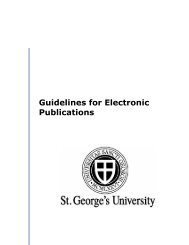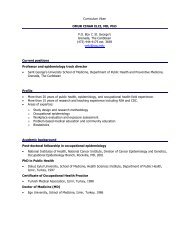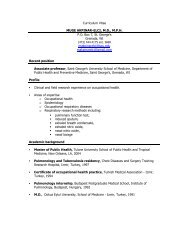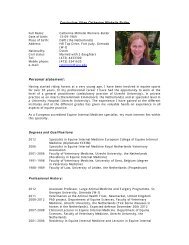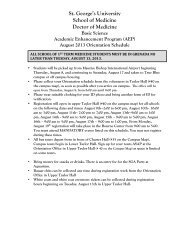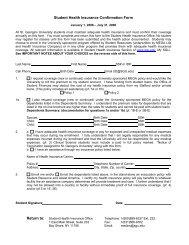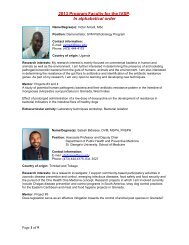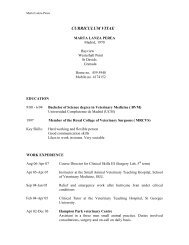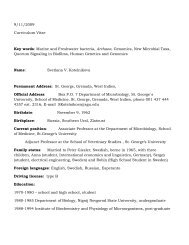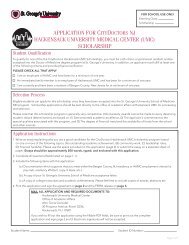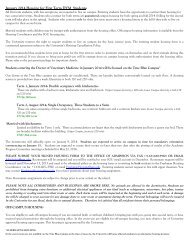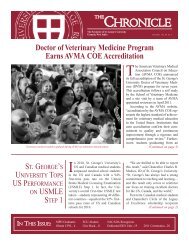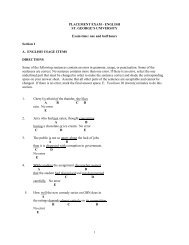SCHOOL OF 2012-2013 - St. George's University
SCHOOL OF 2012-2013 - St. George's University
SCHOOL OF 2012-2013 - St. George's University
Create successful ePaper yourself
Turn your PDF publications into a flip-book with our unique Google optimized e-Paper software.
School of Medicine<br />
Course Descriptions<br />
PUBH 807<br />
Principles of Environmental Health<br />
In this course, students learn about the interaction<br />
between humans and physical, chemical, and biological<br />
agents, in addition to the important impact it has on<br />
health. This course considers important environmental<br />
health issues facing society. Topics include environmental<br />
physiology, radiation protection, air pollution control, water<br />
and wastewater management, food protection, hazardous<br />
material management, ecology and control of animal<br />
vectors of disease, and basic community sanitation issues.<br />
PUBH 808<br />
Maternal and Child Health<br />
This course covers the major issues involved in the provision<br />
of maternal and child care services across countries, special<br />
needs and programs targeting women and children,<br />
changing structure of the family, domestic violence, and<br />
child abuse. A special focus is given to issues involving<br />
maternal and child health in the Caribbean region.<br />
PUBH 812<br />
Nutrition and Public Health<br />
Nutrition and Public Health covers the roles and<br />
applications of nutrition to assess community needs, shape<br />
policies that affect the public’s health, and manage public<br />
health nutrition programs. This course examines major<br />
health conditions and diseases within populations that have<br />
strong nutritional components.<br />
PUBH 813<br />
Chronic Disease Epidemiology<br />
This course covers principles, methods, and issues in<br />
the epidemiology of chronic diseases. Chronic Disease<br />
Epidemiology starts with a strong focus on preventive<br />
medicine, and explores the risk factors for various chronic<br />
conditions. The course covers major conditions in extensive<br />
detail, including cardiovascular disease, cancer, diabetes,<br />
lung disease, arthritis, and neurological disorders.<br />
PUBH 816<br />
Occupational Health<br />
This course provides students with the knowledge and<br />
skills to recognize and evaluate common occupational<br />
hazards (for example, chemical, physical, biological, and<br />
psychosocial), which are followed by a review of common<br />
approaches that can be taken to prevent these hazards<br />
from causing work related diseases and injuries. The<br />
relationship between workers and their jobs, with respect<br />
to health outcomes, are explored from historical, scientific,<br />
and policy perspectives. A systematic approach to the<br />
study of the causes and extent of work-related injuries and<br />
ill health is emphasized. Principles of occupational safety<br />
and models of accidents, causation, and investigation are<br />
also covered.<br />
PUBH 824<br />
Preventing Mental Illness: Global Perspectives and<br />
Universal <strong>St</strong>rategies<br />
This course provides an advanced introduction to<br />
community psychology, public health theory, and research<br />
with the goal of helping students to develop a global<br />
understanding of the prevention of mental illness. This<br />
course is divided into three components:<br />
• Section I: Psychological Theory and Research<br />
Psychological Theory and Research is primarily concerned<br />
with person-environment interactions and the ways<br />
society impacts individual and community functioning.<br />
In this section of the course, students will explore the<br />
framework of community psychology theory and practice.<br />
• Section II: Prevention and Primary Care<br />
<strong>St</strong>udents will investigate the integration of psychological<br />
theory with public health medicine. In particular, the focus<br />
will be on the role of the primary care provider in mental<br />
health illness prevention.<br />
• Section III: Specific Areas of Prevention<br />
During this section of the course, students will focus on a<br />
variety of psychosocial issues and the practical application<br />
of psychosocial theory and research to the prevention<br />
of mental illness, in addition to the promotion of mental<br />
health and wellness.<br />
PUBH 825<br />
Family Violence: A Public Health Problem<br />
This course presents an in-depth study of family violence,<br />
a growing public health problem. Characteristics of the<br />
problem, its history, and its numerous manifestations<br />
in specific population groups across the life span will<br />
be studied. The role of public health agencies and their<br />
interface with the criminal justice systems will be an<br />
important focus. Prevention strategies and community<br />
responses to the problem will provide students with the<br />
opportunity to evaluate and plan a public health solution<br />
to a specific aspect of family violence for a geographic<br />
location of their selection.<br />
84 | <strong>St</strong>. George’s <strong>University</strong>



